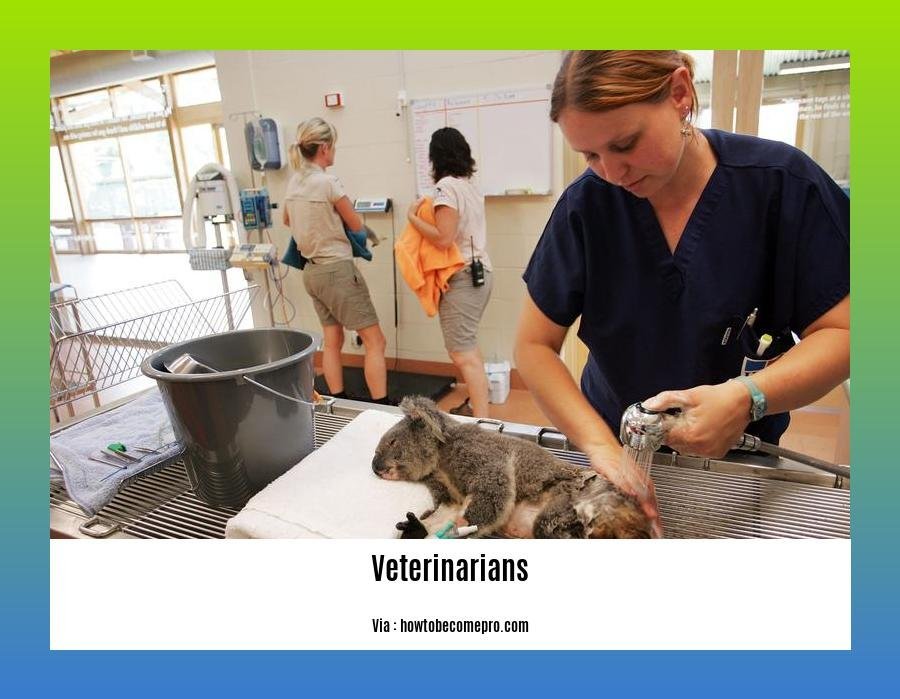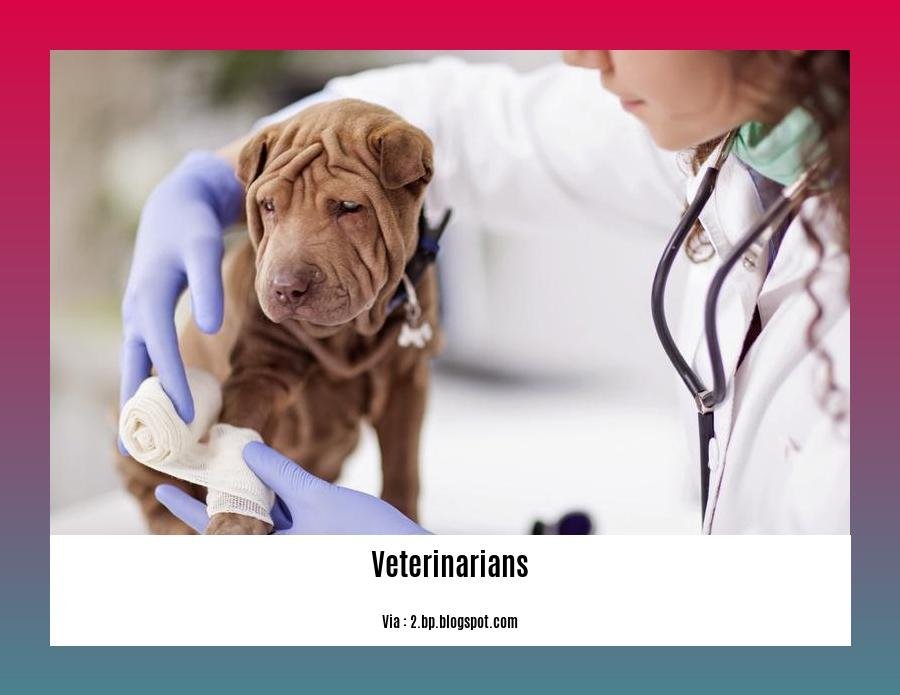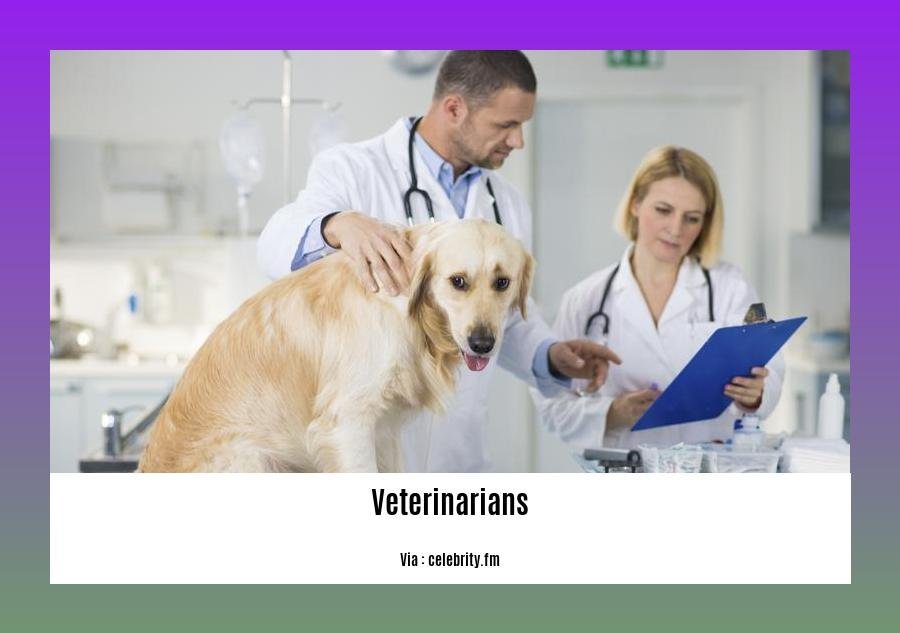Get ready to uncover the incredible world of veterinarians as we delve into the fascinating realm of their essential role, extensive education, and unwavering dedication to animal health and welfare. In this informative article, we will unveil captivating facts about veterinarians, shedding light on the vital role they play in ensuring the well-being of our beloved animals. From their comprehensive education to their compassionate expertise, join us as we explore the fascinating world of these devoted professionals.
Key Takeaways:
- The word veterinarian comes from the Latin word “veterinae,” meaning working animals.
- Approximately 80% of veterinarians are women.
- Veterinarians can choose a specialty, such as companion animal, exotic animal, food and livestock, laboratory, or veterinary specialists.
- Veterinarians undergo 8 to 12 years of training for their careers.
- Veterinarians work long hours and are usually on call around the clock.
- They possess the skills to deal with scared, dangerous, or aggressive animals and provide comfort to their owners.
- Veterinarians enjoy ample job opportunities and can earn more than $90,000 per year.
- 61% of all human diseases originated in animals.
Facts About Veterinarians: Unveiling the Essential Role, Education, and Dedication

As animal lovers, we may have crossed paths with a veterinarian at some point in our lives. But do we truly understand the essential role these professionals play in the well-being of animals? In this article, we will unveil some fascinating facts about veterinarians, shedding light on their extensive education, practical skills, and unwavering dedication to promoting animal health and welfare.
The History and Education of Veterinarians
The word “veterinarian” stems from the Latin word “veterinae,” which translates to “working animals.” This etymology perfectly encapsulates their primary purpose: caring for animals and ensuring their well-being. However, a veterinarian’s journey to becoming a trusted animal healthcare provider involves rigorous education and training.
Did you know that veterinarians spend 8 to 12 years training for their careers? Yes, you read that right! These dedicated professionals undergo a comprehensive academic curriculum, including pre-veterinary studies and veterinary school. Their education covers various disciplines such as anatomy, physiology, pharmacology, and surgery, equipping them with the knowledge and skills necessary to diagnose and treat different animal species.
The Essential Role of Veterinarians
Veterinarians play a vital role in safeguarding animal health, and by extension, public health. They are the unsung heroes who work tirelessly to prevent, diagnose, and treat diseases in animals. But their responsibilities go beyond medical care. Veterinarians are also passionate advocates for animal welfare, ensuring that animals are treated with compassion and respect.
Animal diseases can sometimes pose a threat to human health. In fact, did you know that 61% of all human diseases started in animals? As experts in zoonotic diseases, veterinarians are at the forefront of disease surveillance and prevention. By monitoring and controlling animal diseases, they contribute to the overall well-being of both animals and humans, keeping us safe from potential outbreaks.
Specialties and Diverse Opportunities for Veterinarians
Just like in human medicine, veterinarians can choose to specialize in various areas of veterinary medicine. Specializations include companion animal, exotic animal, food and livestock, laboratory, and veterinary specialists. Each specialty focuses on specific areas of animal care, ensuring that animals receive specialized attention according to their unique needs.
Apart from specializing in a particular field, veterinarians also have diverse job opportunities. They can work in private practice, research institutions, government agencies, zoos, and wildlife conservation organizations. This range of opportunities allows veterinarians to pursue their passion for animal welfare and make a difference in various settings.
The Challenges and Rewards of Being a Veterinarian
Being a veterinarian is not without its challenges. These dedicated professionals often find themselves dealing with scared, dangerous, or aggressive animals. Not only do they need to provide medical care, but they also have the essential task of comforting and reassuring worried pet owners. The ability to navigate these situations with empathy and grace is a true testament to their character.
Moreover, veterinarians dedicate long hours to their work and are usually on call around the clock. Their commitment and perseverance ensure that animals receive prompt attention even during emergencies. Despite the challenges, veterinarians find immense fulfillment in their profession. The joy of nursing an animal back to health or witnessing the bond between a pet and their owner is what keeps their passion alive.
The Surprising Facts and Figures
Did you know that approximately 80% of veterinarians are women? This statistic showcases the pivotal role women play in veterinary medicine and their dedication to animal health and welfare. The field of veterinary medicine has also evolved over the years, becoming more inclusive and diverse.
In addition to making a difference in the lives of animals, veterinarians can also enjoy a rewarding career. With ample job opportunities, veterinarians can earn more than $90,000 a year, reflecting the value society places on their expertise and contributions.
Conclusion
As we unveil these intriguing facts about veterinarians, we gain a deeper appreciation for their role in animal health and welfare. From their extensive education and specialization to their unwavering dedication and the challenges they face, veterinarians are true champions for animals. So, the next time you visit your trusted veterinarian, remember the incredible knowledge and care they bring to ensure the well-being of our beloved furry friends.
Did you know that Liverpool is home to some fascinating facts about the city? Discover interesting tidbits and hidden gems by clicking here to explore more about Liverpool.
Are you curious to learn about the rich culture and heritage of Gujarat? Click here for intriguing facts and captivating stories about this vibrant Indian state.
If you want to explore the exciting world of STEM education and the Strand curriculum, click here to uncover amazing facts and insightful information.
Looking for interesting facts about family dynamics and relationships? Look no further! Click here to discover fascinating insights about family structures and dynamics.
Common Services and Procedures Provided by Veterinarians

When it comes to taking care of our furry friends, veterinarians are the unsung heroes. These dedicated professionals play a vital role in ensuring the health and well-being of animals. From routine check-ups to complex surgeries, veterinarians provide a wide range of services and procedures to keep our beloved pets healthy and happy. Let’s take a closer look at some of the common services and procedures provided by veterinarians.
- Preventive Care:
- Vaccinations: Vaccinations are a crucial part of preventive care for both companion animals and livestock. These vaccines help protect animals from a range of infectious diseases and ensure long-term health.
Wellness Exams: Regular wellness exams are important for early detection of any underlying health issues. Veterinarians conduct thorough physical examinations, assess vital signs, and provide necessary preventive treatments.
Diagnosis and Treatment:
- Medical Examinations: When animals are not feeling well, veterinarians conduct comprehensive examinations to diagnose the cause of their symptoms. They use their knowledge and expertise to determine the best course of action.
- Laboratory Tests: To further investigate a medical condition, veterinarians may order laboratory tests such as blood work, urine analysis, or imaging scans. These tests help in accurate diagnosis and treatment planning.
Surgery: Veterinarians perform various surgical procedures, ranging from routine spaying and neutering to complex surgeries. They ensure the safety and well-being of the animals throughout the surgical process.
Dental Care:
- Dental Cleaning: Just like humans, animals also require regular dental care. Veterinarians perform dental cleanings to remove plaque and tartar buildup, improving oral health and preventing dental diseases.
Extractions: In cases of severe dental diseases or injuries, veterinarians may need to perform tooth extractions. This helps alleviate pain and prevent further complications.
Emergency and Critical Care:
- Trauma and Injury Treatment: In emergencies, veterinarians are the first responders. They provide immediate medical care and treatment for animals that have been involved in accidents or suffered traumatic injuries.
Critical Care Management: Veterinarians play a crucial role in managing critical cases, such as severe infections or organ failures. They provide intensive care, monitor vital signs, and administer appropriate medications.
Behavioral Consultation:
- Behavioral Issues: Veterinarians also assist in addressing behavioral problems in animals. They evaluate the underlying causes of behavioral issues and provide guidance and recommendations for behavior modification and training.
These are just a few examples of the common services and procedures provided by veterinarians. Their expertise extends beyond what is mentioned here, as they are constantly staying updated with the latest advancements in veterinary medicine. The dedication and compassion of veterinarians ensure that our animal companions receive the best possible care.
Key Takeaways:
– Veterinarians provide a wide range of services and procedures to ensure the health and well-being of animals.
– Preventive care, including vaccinations and wellness exams, is vital for maintaining animal health.
– Veterinarians diagnose and treat medical conditions through thorough examinations and laboratory tests.
– They perform various surgical procedures, including routine and complex surgeries.
– Dental care, including cleanings and extractions, is an important part of veterinary services.
– Veterinarians offer emergency and critical care for animals in need of immediate medical attention.
– They also provide behavioral consultations to address behavioral issues in animals.
References:
[^1^]: The American Veterinary Medical Association
[^2^]: American Animal Hospital Association
Important Skills and Qualities for Veterinarians
Communication Skills
– Veterinarians need excellent communication skills to effectively discuss cases with clients, understand their concerns, and provide instructions on animal care.
– Building trust and maintaining clear lines of communication is crucial in establishing strong relationships between veterinarians, clients, and their pets. (ResumeCat)
Compassion
– Compassion is essential for veterinarians, who must genuinely care for their animal patients and show kindness and respect towards them.
– Veterinarians must also be sensitive to the emotions and concerns of pet owners, showcasing empathy in their interactions. (Truity)
Empathy
– Strong empathy skills allow veterinarians to understand and relate to the experiences and emotions of both animals and their owners.
– This ability to connect with their patients and clients helps veterinarians provide effective care and support. (St Matthew’s University School of Veterinary Medicine)
Organizational Skills
– Organizational skills are vital for veterinarians to efficiently manage their workload, keep track of appointments and medical records, and ensure all tasks are completed on time.
– These skills help maintain order and provide quality care to animal patients. (Truity)
Time Management
– Effective time management is crucial for veterinarians to prioritize tasks and provide timely and efficient care to their patients.
– This skill ensures that all animals receive the attention and treatment they need. (ResumeCat)
Stress Management
– Veterinarians must have effective stress management skills to cope with the demands of their work.
– These skills enable veterinarians to maintain a clear mind, make sound decisions, and provide quality care even in challenging situations. (ResumeCat)
Patience
– Patience is a virtue every veterinarian should possess while diagnosing and treating animals.
– Dealing with frightened or anxious animals requires creating a calm and safe environment, requiring patience from veterinarians. (Truity)
Physical Stamina
– Being a veterinarian is physically demanding, necessitating good physical stamina.
– Standing for long periods, lifting and carrying heavy animals, and performing physical tasks during surgeries and treatments all require physical endurance and strength. (St Matthew’s University School of Veterinary Medicine)
Key Takeaways:
- Veterinarians require a unique set of skills and qualities to excel in their profession.
- Important skills and qualities for veterinarians include excellent communication skills, compassion, empathy, strong organizational skills, effective time management, stress management, patience, and good physical stamina.
Challenges and Rewards of a Veterinary Career
Being a veterinarian is a fulfilling and challenging career that allows individuals to make a positive impact on the lives of animals and their owners. In this article, we will explore the challenges and rewards of a veterinary career and shed light on the essential role, education, and dedication required in this profession.
The Challenges of a Veterinary Career
Working as a veterinarian comes with its fair share of challenges, both emotionally and physically. Veterinarians often deal with scared or aggressive animals, which can be demanding and require patience and skill to handle effectively. Additionally, comforting worried pet owners and navigating difficult end-of-life care decisions for animals can be emotionally draining.
The veterinary profession is also physically demanding. Veterinarians and veterinary technicians endure sweaty, smelly, physically challenging work because of their love for the job and passion for helping animals. From handling large animals to performing surgeries and treatments, physical stamina is crucial for navigating the demands of a veterinary career.
The Rewards of a Veterinary Career
Despite the challenges, a career in veterinary medicine offers numerous rewards. Veterinarians have the opportunity to make a difference in the lives of animals and positively impact their health and well-being. The joy of nursing animals back to health and witnessing the bond between pets and their owners is incredibly fulfilling.
Not only do veterinarians play a vital role in safeguarding animal health, but they also contribute to public health. They are experts in zoonotic diseases, which are diseases that can be transmitted from animals to humans. By identifying and treating these diseases, veterinarians help ensure the well-being of both animals and humans.
The veterinary profession also offers opportunities for personal and professional growth. Veterinarians can specialize in various areas, such as companion animals, exotic animals, food and livestock, laboratory, and veterinary specialists. This allows them to explore their interests and develop their expertise in specific fields.
Key Takeaways:
- Being a veterinarian can be emotionally and physically challenging, requiring patience, compassion, and physical stamina.
- The rewards of a veterinary career include making a difference in the lives of animals, contributing to public health, and opportunities for personal and professional growth.
Citations:
- The Advantages of Being A Veterinarian (Plus Co… World Veterinary Day
- 25 Reasons Being A Veterinarian Is Th… Work Life Pivot
FAQ
Q1: What does the word “veterinarian” mean?
A1: The word veterinarian comes from the Latin word veterinae, which means “working animals.”
Q2: What percentage of veterinarians are women?
A2: About 80% of veterinarians are women.
Q3: What are the different areas of specialization for veterinarians?
A3: Veterinarians can choose specialties such as companion animal, exotic animal, food and livestock, laboratory, or veterinary specialists.
Q4: How long do veterinarians train for their careers?
A4: Veterinarians typically spend 8 to 12 years training for their careers.
Q5: What are some of the challenges veterinarians face in their profession?
A5: Veterinarians are usually on call around the clock, work long hours, and have to deal with scared, dangerous, or aggressive animals. They also have to comfort animal owners during difficult times.
- Georgia Platform: A Southern Strategy, 1850s - March 31, 2025
- How many weeks is 40 days: Quick Conversion Guide for Accurate Results - March 31, 2025
- How many feet is 300 meters? 984 Feet: Understand Length Conversions Easily - March 31, 2025
















